Sports
EXCLUSIVE: Pak’s Constantine upbeat despite challenges | The Express Tribune
Published
4 مہینے agoon
By
l955w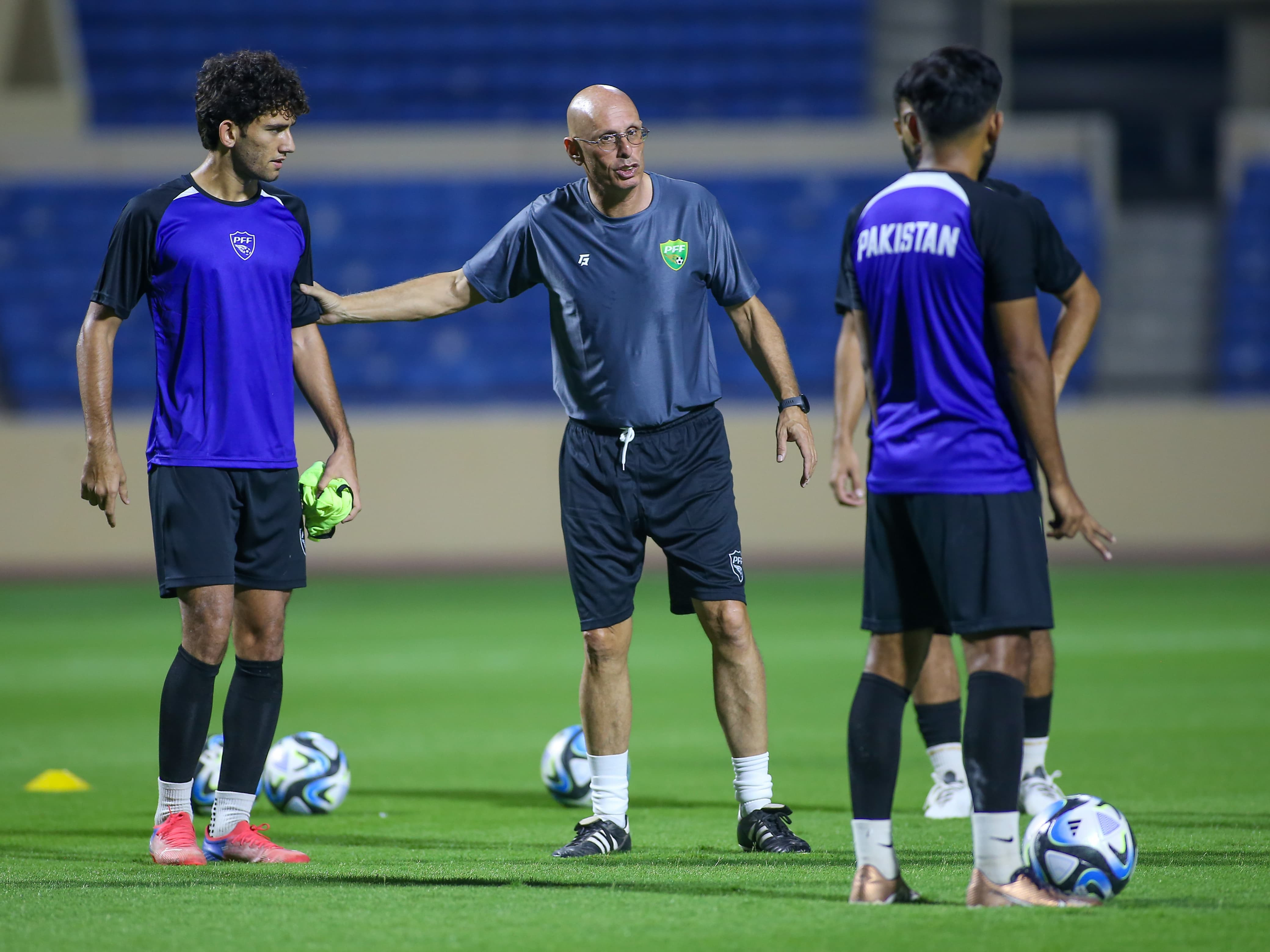
The country is taking on Saudi Arabia in the high-profile 2026 FIFA World Cup qualifiers match at home
KARACHI:
If Pakistan football has to be a brand under Stephen Constantine, it has got to empathy.
While Pakistan is heading out to face Saudi Arabia in their penultimate 2026 FIFA World Cup Asia qualifying fixture, placed in Group G second round.
It is undoubtedly the highest profile match that the team is playing at home with the world ranked 53, while Pakistan, after creating history by faring beyond the first round last October with the sole win at the world cup qualifiers in the history have nothing to lose.
It’s a band of spirited players lead by a coach that is straightforward, honest, and has a long-term vision for rehabilitating Pakistani football and footballers from decades of a depraved system which dragged the nation so far behind in the sport without basic facilities, infrastructure, player care coupled a penchant for enjoying only short-term, rather trivial successes in the past.
Despite the glimmer of hope Pakistan football is stuck in an ouroboros of institutional crisis and lack of professionalism or organisation on almost every level never focusing on sport itself or the development.
For this leg of the qualifiers, however, Constantine has been able to see how Pakistani players play in domestic events and get the first taste of it since his appointment as the head coach of Pakistan in September.
He witnessed the National Challenge Cup final round which concluded on May 12.
This is where he chose the players for the national camp for the upcoming home-matches against Saudi Arabia and Tajikistan.
We began the conversation with an obvious and a rather simplistic question of if he thought domestic Pakistani football has any recognisible style or characteristic.
“I don’t think there’s any particular style of play. The thing that impressed me the most was the enthusiasm and the determination of the players to play,” Constantine told this correspondent.
But going by why it can bet felt the brand will be empathy for Pakistani football was the rest of his reply that tackled the disdainful systemic issues faced by the players despite having all the will that they can gather to dream of playing professional football.
“Um, on some of the pitches that they were being asked to play on, which for me are a disgrace.
“Basically you can’t. You can’t expect..to play good quality football on pitches where there’s no grass or there’s bumps, or there’s big cracks in it, or it’s rock hard. It’s just not conducive to football, although this is what we have, so we have to get on with it until we can change things. But the problem is that.
“They are playing football. But they don’t know exactly what they’re doing while they’re playing, if that makes sense. So, obviously they’re trying to get the ball in between the white balls, but there’s a process and there’s a methodology to do that. And because many of them have not been shown these methodologies or traits then they’re just kicking the ball and running after the ball and basically that was it for the Challenge Cup.”
Constantine, being a veteran at overcoming the odds, both i his personal journey as a former player and a coach knows how to make shikanjbeen (Pakistani lemonade) out of the very sour lemons that the lack of system is throwing at him.
“Having said that, it for me was an opportunity to see Pakistan football in Pakistan with Pakistan players and not get a group of 36 players and then I have to decide from the 36 and I’m happy to say that we selected eight to 10 players from the Challenge Cup that some of them have been called up to the to this camp for the national team,” explained the British-Cypriot manager. “Now whether they stay here or not is a different story. But. They the work that they want to put in, the determination for me is very admirable.”
The conversation that this correspondent had this Monday. It was very kind of Constantine to agree to a Zoom interview despite the busy schedule and being just days away from the all-important fixture.
The confirmation from the Pakistan Football Federation Normalisation Committee (NC) Media Manager the night before was nothing less than a surprise.
Besides the obvious feat of getting the country their first FIFA World Cup qualifying round win since its inception, what sets Constantine apart from the previous coaches is him coming in with niche in helping minnows get good results in the international events, understanding the Asian and African football better than most, but mostly it is the standard and accountability along with passion and affection that you can see he has for Pakistani players.
He is also the first man to have coached both Pakistan and India in the modern era. Infact including Pakistan he has now coached three out of seven South Asian countries.
And that alone gives him a unique perspective on how to adapt and work around the incongruent set up and take the challenges head-on to help Pakistan football progress in a meaningful way both on the international and domestic level.
“Look, I think. What needs to happen is that the government, in this case, needs to step up. I mean, we have fantastic facility here in Islamabad, but which is exactly the same thing in India. They have fantastic facilities in every state. They have stadiums in every state, but then you go into the changing rooms, and it looks like it’s from 1960 or something.. and you think, wow, you’ve got this land, you’ve got all this facility and you’re not putting the money in to maintain it, at least maintain it,” wondered Constantine.
“I don’t say make it state-of-the-art. It doesn’t need to be state-of-the-art, but it needs to be maintained. Outside the Jinnah Stadium. You have two-three training pitches. They’re not maintained, they’re not even watered. And so, when you go on there, it’s. Like a complete risk of injury because the pitch is so hard, they have a water irrigation system for the hockey pitch, which is 10 metres behind the football pitch. But there’s no irrigation system for the football pitch.”
At the heart of all the issues is the lack of willingness by the state and the sports authorities of the country that are failing to recognise and adopt football as a lucrative cultural, socio-economic, and international capital.
Football after all, empirically, the world’s biggest sport and cricket, that has state patronage, lags far behind in scope as an international sport.
In Pakistan too football on the grassroots is more democratised, working people’s game and historically has been far more diverse in its roots and representation of athletes from different regions and communities of the country compared to cricket.
“I’m struggling to understand what is it that Pakistan doesn’t understand about football in terms of. Does anybody have any idea the amount of publicity, money, goodwill and that they would have if they embrace football? It’s just beyond me,” said Constantine.
“I know we are cricket loving nation, but for God’s sake, only 12 countries in the world play cricket to any level and Pakistan happens to be one of the top six out of the 12. Big deal.”
When pointed out that cricket is the establishment’s game, he was quick to roast this notion.
“What does? What does that even? What does that even mean? There are 212-211 countries that play football in the world 211. How many countries play cricket? Oh, I understand there’s a World Cup 20. We have more countries in Asia that play football than play cricket. So yeah, I don’t understand that,” he added.
Steel motivation
Given the drawbacks and shortcoming, Pakistan’s achievement in FIFA World Cup qualifiers is significant in capturing people’s attention and showcasing the potential it has to succeed. Howeve, after the first-round match, like it was expected, Pakistan have not won any of the second-round matches. The Greenshirts have been slotted in Group G with Saudi Arabia (highest ranked team among the four), Tajikistan (ranked 99th) and Jordan (ranked 71st in the world).
Pakistan are, so far, at the bottom of the group having lost all four games (home and away) with a goal differene of -19.
The second round of the 2026 FIFA World Cup qualifiers also serves as the 2027 Asian Cup qualification that will conclude on June 11.
The winners the nine groups will progress into the third round and qualify for the Asian Cup, whereas the third and fourth place teams will be able to book their places in the third round of the 2027 Asian Cup qualification.
And there lies the sweetness of the entire endeavor despite the difficult situation in the World Cup qualifiers. There lies Constantine’s gift to the Pakistani nation, just by the virtue of going beyond the first round, the country has a spot in Asian Cup now, something bigger to look forward to than just South Asian Football Federation (Saff) Championship, if all goes well.
It was important to ask him how he stays motivated and if he has any rituals for himself and the team in the locker room to keep the spirits up as well. After all, being at the bottom of the group and conceding 20 goals is not easy to process.
“I think. Me, I don’t need motivation, just being just being the coach of Pakistan is motivation enough for me. I don’t need anybody to pump me up. I’m pumped up from the beginning,” said the member of FIFA’S elite coaching panel.
He explained that he bonds with the players and his intention is always toi understand them better: “It’s with the players I don’t have one set thing that I would say to them. I think that you have to have a bit of variety. You can’t use the same thing every game. So, I talked to them before the games, I talked to them during the week, you know, it’s we do a lot of one-on-one with the players not.., not necessarily about the performance, but about how they’re feeling about what this means to them about the importance of understanding their role within the team. So, I spend a lot of time with the players off the pitch, maybe more than I do on the pitch, and that’s not just in Pakistan. That’s everywhere I go. I like to understand them. I like to know what they’re doing, what’s going on in their lives. Have they had the baby in the family, somebody sick or, you know, because all of these factors, I think make a difference to them and if they make a difference to the players then that makes a difference to me so.
The skipper represents coach’s personality
The former coach/author and the book of the year nominee for the British Sports Book Awards, Constantine, enjoy connections in the football community as being one of the most well-travelled coaches in the world.
In his book, which is an very pleasant read, From Dehli to Den, he said that the skipper reflects the manager’s personality.
Constantine has picked a variety of players to wear the captain’s band whose characteristics matched his game, your tactics and personality based on one criterion.
“They’re leaders. Leaders of men,” said the manager. “I want people who know what it’s like in the difficult moments, everyone could be a leader. When everything is going good, but when when the when, the issues, the problems begin to happen. How do they react? We’re one nil down. What’s the reaction of the captain? What’s he doing on the pitch? Because basically you need somebody. That reflects your personality as much as possible.
“I mean, I was a little terror when I was playing, so I not necessarily a good idea, but you know, not now anyway, so it’s important that they understand what I want. And yeah, we have four or five captains in my teams. The reason for that is I get a complete understanding of everybody, not just some of the players because they all come from different states in different parts of the world. So it’s important that we have that.”
Who can play for Pakistan?
When it comes to the players’ front, there was also a notable absence of England-based defender Easah Sulaiman in the camp. He was one of the captains in the previous legs.
“So firstly, I’ll start with Easah because he’s one of the captains. He called me about two and a half weeks ago. We speak. I speak with him. I speak with many of the players even when I’m not in Pakistan. He was granted permission to go to the Hajj in Saudi Arabia and I think it it’s once a year that it happens and and in some cases it’s it’s not easy to get on.
And he asked if he could be excused from the camp for this reason. And, of course, I am not going to interfere with anyone’s religion and he got the permission to go now,” informed Constantine.
Lately, there had been a conversation of sending Harun Hamid back from the camp for the last two matches. He scored the winner for Pakistan against Cambodia which catapulted the team into the second round of the World Cup qualifiers.
While an egotistical storm stirred on the social media by another England-born player Adil Nabi earlier this year, whose younger brother is very much a consistent part of the current squad.
There are clear signs of the lack of grooming of not just the local players bron and bred in Pakistan without a half decent club-system or academies and a complete absence of professionalisation of the sport, but also for the diaspora player that are deemed precious and beyond criticism by a certain section of the fans.
The diaspora players have better basic understanding of the game on the field while playing, their techniques are better by virtue of luck that they have been born and bred in Europe nor America.
“You talked about two other players. I’m not going to go into the details of that, but you gotta wanna play for Pakistan. Not for yourself,” replied Constantine.
“OK. And I will leave it there. With those two. Um.”
But he highlights the influx of diaspora players who want to represent Pakistan, and he needs them according to how they would fit into his system and depending on their status of Pakistani passport.
“I have spoken to quite a few of the diaspora players, there’s a couple in Cyprus, there’s a couple in Denmark, there’s quite a few in Norway. There’s some in England, there’s some in the US. And I get almost daily, requests from Pakistani English or Pakistani American or Pakistan that they want to play for Pakistan.
“And I replied to 99% of them basically saying, where are you? What level are you at? How old are you? And I also the second question is, do you hold the Pakistani passport?
“And 99% of them do not.
And the process to get a Pakistani passport is lengthy and a lot of things need to be done. Now If they are willing to go and get the passport and go through the hoops that you need to go through to get this passport, that’s fine, but there’s no point doing it if they are at a certain level, which is not going to be what we need, there’s no point bringing somebody who plays in the 8th division in England. He’s not going to help me. There’s a reason that he’s in that division.”
Being honest is a pre-requisite
Constantine illustrated through Harun’s case again the in order for the disapora players to serve well for Pakistan, they need to be self-aware and honest with their situation so they can serve Pakistan in a better capacity.
“And quickly going back to Harun, Harun reported to camp with an injury. I don’t think he realised how difficult the injury was we had him scanned. There was no way that he could play in either of the games and to be fair, he should have had that injury scanned before he came. Because they would have told him you’re not playing for the next four to six weeks. So, that’s cleared that up. Obviously, when we are bringing the diaspora players it’s based on their word in terms of that, they’re OK or not in in this case he was not and, unfortunately, we do not have him for the next game,” he empahised.
Observing the opponents
The Arsene Wenger fan, that Constantine is, also has a unique perspective on world football, therefore, it was tempting to ask him which other countries he feels have fared better in the 2026 FIFA World Cup qualifiers in Asia and just overall.
“I think that’s a difficult question because for the last three months I’ve been following four teams. Pakistan, Jordan, Saudi Arabia and Tajikistan,” he explained crisply, but, “Outside of that, I hope England will qualify. We have the Euros now, obviously, yeah, I’d, you know, do I keep an eye on other things?”
He further dwelved into the transience of international football, while bringing the central point of the conversation back to his job at hand.
“I think international football, you focus on what’s in front of you because things change very very quickly. Players change. Coaches change. So, for example, Tajikistan their coach left and who’s going to be their coach? Well, their assistant, their assistant who’s taking over. So, I know him.
“And Jordan coach. There are issues there with him. Maybe he will say maybe he will go. So, I know what’s going on within my group. And then once I get out of the group, I will worry about the rest then. So, it’s otherwise. It’s just too much.”
So does it make it easy for Constantine to read the mind of his counterpart on the opposing side like Tajikistan in this case who he will meet o June 11?
“I think you have to be able to anticipate what the coach is going to do, what their coach is going to do, what system is going to come out with. Everyone knows my system now,” said Constantine.
“Now you need to, you know, work around that but does he have certain minutes where he makes his substitutions? Some guys will only make a substitution in that minute, and it will always be that player. You know, so. It’s good to understand. But, you know, at the end of the day, it’s about what the players do on the pitch, not what you think the other guy is going to do.”
Things that Pakistan should never change
“When I take a job, I act like I’ll be there forever,” is a direct quote from Constantines book, and when asked about the things he would like not to change is Pakistan he definitely put food on the top of that list.
“Things I would like not to change: The food. The characters of the players, I think they’re super. And the people, I think the people here in Pakistan have been extremely good to me. I think the hospitality has been as good as I’ve been anywhere in the world,” replied Constantine.
And from his expereince his has been defending Pakistan back home in England and Cyprus too, given the country’s reputation of volatile law and order situation and general safety concerns.
“You know it’s funny because when I go back to England or when I go back to Cyprus [i get questions like], ohh, what’s it like over there? What’s it like? It’s fantastic. Fantastic scenery. The people are good, the food is good. Yeah, but I haven’t heard or seen any of these issues and I have not been abducted yet or kidnapped. Hopefully that doesn’t happen. I don’t think my family’s gonna pay much to get me back (chuckles).
“But no, no, I have zero complaints about the people as a people, as nice as. I’ve been in India and in in Sudan. The people were fantastic to me and yet I was to be beheaded instantaneously over there if I went to the wrong place or something like that. But you know, I don’t.
Politics and religion are two very touchy subjects that I do not want to talk about. I take you for what you are, how you are. You can be wherever you’re from as long as you’re OK with me.
I’ll be OK with you. And that’s that. So, I don’t want any of those to change.”
Things that need to change immediately
But the list of things that must change for Pakistani football to thrive is long to begin with. From the government’s attitude to the limitation of the FIFA-appointed Normalisation Committee and just the lack of official domestic leagues.
“What we need to change though is we need the government to back whoever is going to run football in this country, you know, I heard a lot of complaints. Why are we not going to the AFC under 17 and under 2020 Asian Cup qualifiers? Look, people don’t understand that at the moment you don’t have a PFF, it’s a Normalisation Committee that is running, running it because it has been so poorly run in the past,” said Constantine.
He is acutely aware of the desperate situation of Pakistan Football Federation’s status, the financial constraints and the possibilities of the dream coming crashing down if the house is not straightend up soon.
“FIFA has intervened, I should say in this situation because we in Pakistan are not doing what we are supposed to be doing. You cannot have a country like Pakistan, you cannot have not get the help from the government in terms of stadiums, in terms of facilities that we have them, we’re not maintaining them and we’re not using them,” he added.
Appeal to the powers that be
Constantine continued, “And I think if I could ever address anybody that had any power, I would say to these guys: You are missing a massive opportunity to be part of the football community worldwide because umm.. TV money, broadcasting, advertising, media, travel, everything is going to go up if Pakistan are involved in Asian Cup qualifiers World Cup qualifiers. I went to a conference couple of weeks ago. And the words that were used were.
“Pakistan is not even on the map. And I said, what are you talking about? We’ve just qualified for the World Cup qualifiers for the first time. We are in the AFC Group with Jordan, Saudi and Tajikistan. We are here and I said this in front of 120 other coaches and technical directors.
So, we have been heard. We need to get our house in order. We need to sort out the problems, get around the table and sort things out. Why are we not going to the Under 17 Asian Cup qualifiers? Because the PFF doesn’t have money. The Normalisation Committee doesn’t have money. We are dependent upon FIFA giving us handouts every month, every other month when they give us the handouts and we cannot afford to arrange, we owe vendors money because we’re not getting any help from anybody else other than ourselves and.
Like I said, we are not ourselves. We are not a PFF, it’s a Normalisation Committee. They’re not even supposed to be doing some of the things that they’re doing. But if they hadn’t done these things, we wouldn’t be sitting here talking about Saudi Arabia.
It’s because the normalisation committee has put some things in place. Luckily, for me, they asked me to come and here we asked now in a World Cup qualifier group if we didn’t qualify. No one’s talking about Pakistan, but now everyone is talking about Pakistan. What happened? Why are they did what? What’s going on? So, the interest in Pakistan football is there.
We need to take advantage of this.”
Get a league, quick!
Constantine has been a veteran in his field and he feels the only way forward, as he has said before, is to start an offical league. ALthough just two days after this interview a franchise league had been launched which is not recognised by the PFF Normalisation Committee, it has a history of rebranding itself since 2019 till it got launched this week finally.
“Get a league. Now I understand apparently there’s a new league coming up. But you know what? If that league is not sanctioned by the Normalisation Commitee. FIFA will not recognise it, the Asian Football Confederation (AFC) will not recognise it. Therefore, it will not happen or it will happen in Pakistan but outside of Pakistan. It’s not going to happen. So what’s the point of having a league that is not going to be recognised by the football authorities? It’s a waste of time,” objects the Englishman.
Stance on franchise leagues
“I am not against a franchise league, OK? I’m not against any league. But the league needs to be controlled by the governing body,” Constantine put his thoughts about the idea of franchise leagues across.
“The governing body is either the Normalisation Committee or the PFF, if it’s not.
If it’s not governed by that, then the players registrations will be invalid. I will not be able to select those players for the national team, OK.
And then because I have seen this film before, the government will then decide that certain players or whatever will not be allowed to travel. Yeah, and prevent them from travelling with the national team. Then FIFA’s gonna say good night. And that’s how it ends.”
Can Pakistan have Players’ trade union?
As a sports fans and sports journalist, this correspondent finds Constantine’s greatest achievement to be unionizing the players in India, in his book he also explained how he established a network of coaches as well.
Ultimately, it is the players who must play on the field, and therefore it is necessary to take care of their needs on and off the field if a country even dreams to win
That’s where his empathy and the will to empower the underdog really shines.
In Pakistan, athletes in general are mistreated are at a loss perpetually due to lack of awareness of their rights, getting pushed around by the officials, there have been instances of footballers being threatened and junior players being neglected to women footballers being abused by the national team coach.
It was all but important to ask if Constantine sees the possibility of setting up such a union in Pakistan and what is the path to take to make for it to become a reality.
“You have to have empathy for the players, OK, they have lives. They have issues, they have problems, they have breakdowns. They have all the things that everybody has in their own personal lives first, so if you understand that part of it and treat them with the respect that they deserve, and it’s not based on whether they’re good or not good. You know, I think you know from the day I came, I have changed or tried to change things obviously with the help of the normalisation committee,” he explained giving the context to the work he has been able to do so far to improve the conditions for the players.
“We changed the hotels, we changed the food, we changed travel, we changed the accommodation, we changed uniforms, kits. I think if you ask the players now, can you tell us? What is it like now with the coach? What was it like when he, when he came, I think they will say that we have made some major changes.
“I mean now we’re staying in the best hotel here in Islamabad, the hospitality that we have here is. Fantastic. They give us everything we want, everything that we want and that’s great. And also I think. It’s important. So yeah.
“Would I have a players committee? Of course there needs to be a players union. There needs to be a process whereby there is a consistent level of understanding with what the athletes need, what the players have to have in order to perform.
“Now we’re not going to get everything that we want. We understand that we need to earn that, and how do we earn that?
“We earn that by winning football matches. And I think that will come, but you need you need we really need to establish a league. And as I’ve said many times before.”
League proposal
“I would propose a 12-team league. Home and away. That’s 22 games. Then you would split the top six and the bottom six. Another 10 games. That qualifies us for AFC competitions,” he presented the solution, but with a caveat.
“No foreign players in the league. I don’t care where they come from. No foreign players in the league for the first three years. Why? So, we can develop the Pakistani players.
Comparison with Indian Super League
Constantine had faced criticism in India for his clearcut stance on the franchise league there, and he feels there needs to be an organic growth that should drive the development of the game instead of only going for short-term gains. Pakistan must opt for the long-game.
“We look at the Indian Super League (ISL) and the ISL is absolutely Mrs Ambani. It was her. What a fantastic idea…. But they went with seven foreigners the first time and bought all of these players that were, shall we say five years past their sell by date? But they were big names, attracted people.
“I refused to go to the games because I didn’t want to watch seven old foreign players playing. I wanted to see the Indian players. They changed it. Now there are four foreigners, which is. Acceptable.
“I think that for the first three years of a league we cannot have foreigners.
“We need decent coaches. So, maybe we bring the coaches from outside, develop our Pakistani coaches at the moment, you know.
“I was speaking to a girl yesterday who wants to get involved in football and she said but there’s no courses. So what am I gonna do? I wanna. I wanna be involved in football. And I went well, OK. I’m not sure what to tell her because we don’t have anything at the moment. So, coach education is something that really we need to reignite or restart. But listen, I could go on all day so,” he concluded.
Immediate future after the FIFA World Cup qualifiers
There are many possibilities for Pakistani team, and Constantine will be upholding his players to his standards, prioritising young talent.
“OK, so after this we will we’ll all go home for three-four weeks,” he replied, while also addressing the current squad, the changes made in it and how it ties in with the future spots in the team.
“And then we have the under 20 SAFF tournament that we are preparing for and going back to your question where you said, why have there been so many changes? There haven’t been so many changes. You just seeing new faces, four or five new people. I want to give all the players the opportunity. Some players have had one, two, three camps. This is I think the 4th camp. Some of them haven’t been up to the mark for me some. OK, but it’s…
“You know, you go to the Challenge Cup. Imagine if I went to the Challenge Cup and didn’t see anybody there. That I felt could help us. That would be really disappointing. That’s not the case and I believe we have five or six players who are in the camp? They are still here and most likely there will be several of them still in the camp when we make the cut in a couple of days, so I think.
“That’s the answer to that. But yeah, we have the SAFF, which will be in Nepal in August 18th. So we will, we will come back and prepare for that. And as you can see, I have four or five players who are under 20 in this camp and that is a very good sign for the future, for Pakistan football because you know, a lot of teams they want to be 30 plus and you have like 10 players over 30. Their best time is gone, but they’re still in the camps. That’s not happening. We will be young, hungry, and determined,” he said as we wrapped up the interview and he had to get back to training the team.
You may like
-
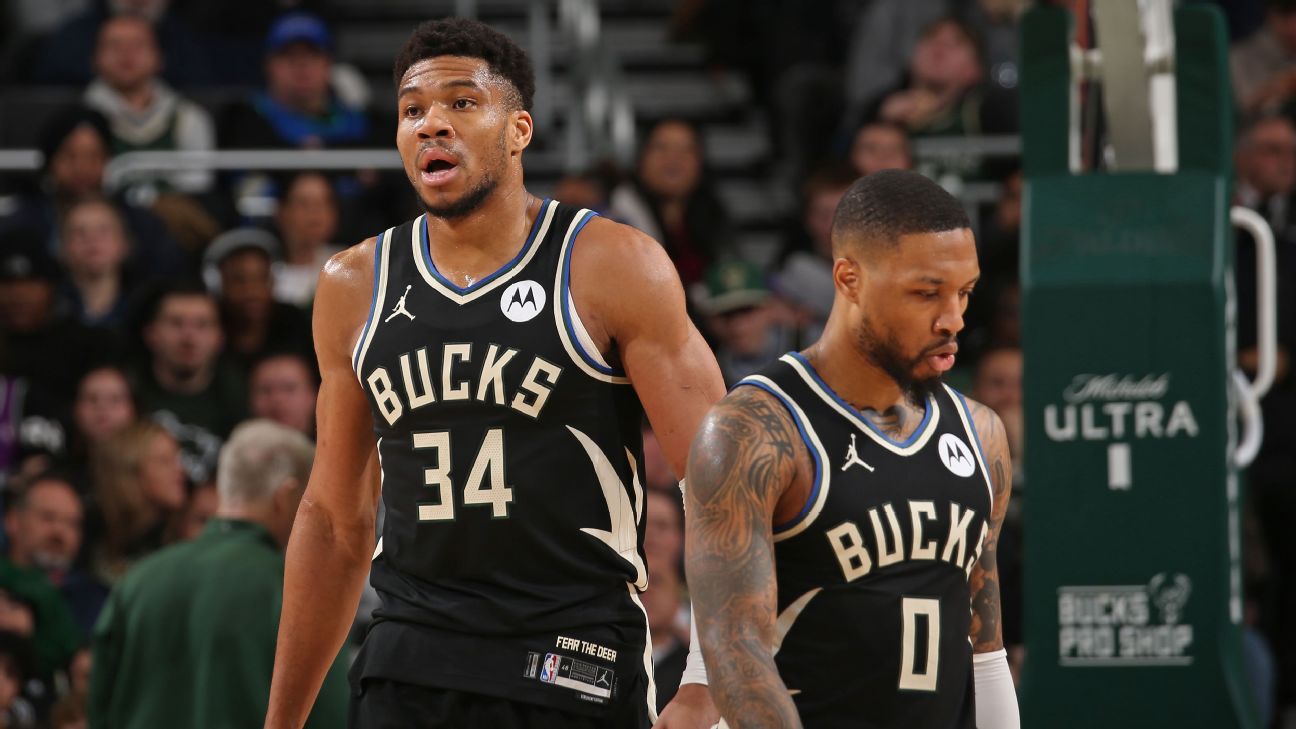

Is continuity enough to get the Bucks back into title contention?
-
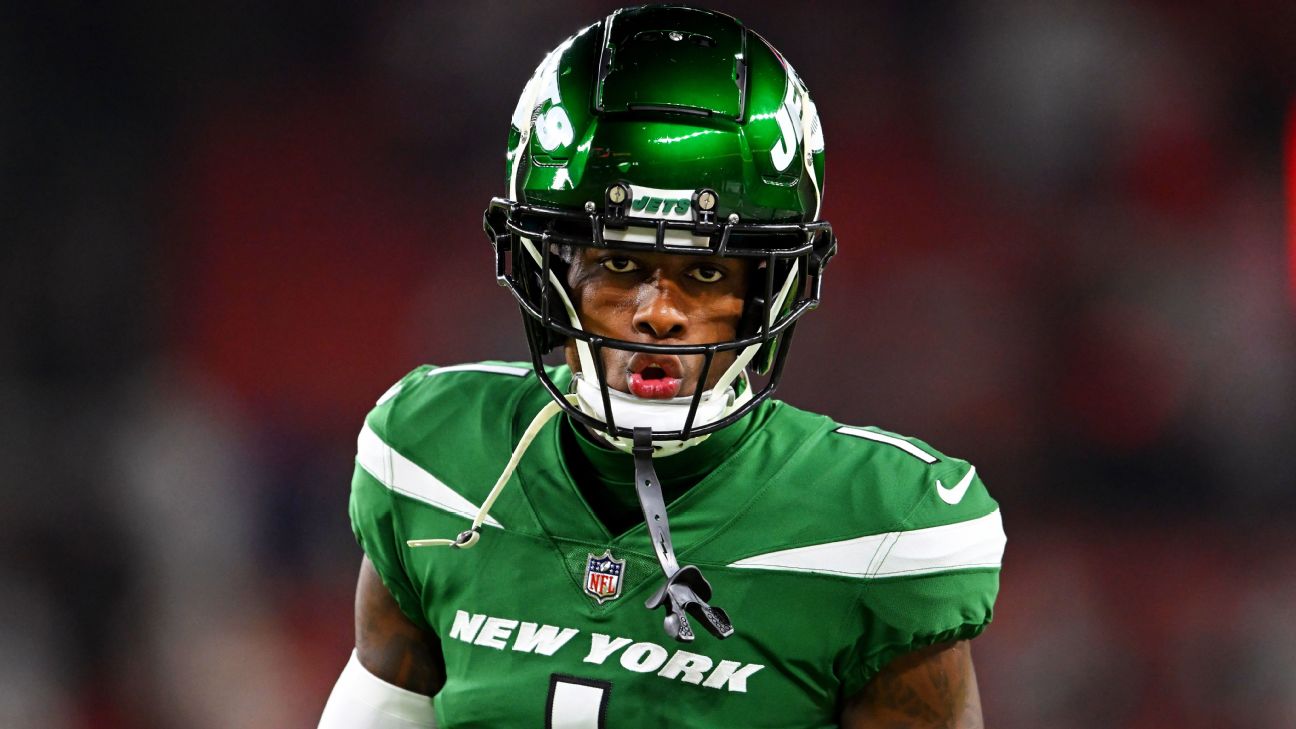

Will Sauce Gardner’s quest to be the best CB be overshadowed by lack of interceptions?
-


Honda CD70 Dream Latest Price, Installment Plans – Sep 2024 Update – Pakistan Observer
-


Check Property Ownership in Lahore, other Punjab cities Online – Pakistan Observer
-


Suzuki Bolan discontinued in Pakistan after 36 years; Here’s replacement for ‘Carry Dabba’ – Pakistan Observer
-


Revised schedule of Pakistan vs England Test series announced
-


Gold prices reach historic high in Pakistan – Pakistan Observer
Sports
Is continuity enough to get the Bucks back into title contention?
Published
3 گھنٹے agoon
ستمبر 21, 2024By
l955w
Trent had known Rivers since he was 6 years old thanks to his father, Gary Trent Sr., whose NBA career overlapped with Rivers’. Trent Jr. had been a productive player with the Toronto Raptors for three and a half seasons but failed to reach an extension or find a multiyear deal on the free agent market. Word was out that Trent could be seeking a one-year deal for the 2024-25 season, and Rivers jumped at the opportunity.
The Bucks were seeking a replacement in their starting lineup for guard Malik Beasley and saw a youthful energy in Trent, who could fit smoothly alongside Milwaukee’s superstar duo of Giannis Antetokounmpo and Damian Lillard.
Signing Trent to a one-year deal served as the biggest offseason addition for a team that prioritized depth signings over bold moves. The Bucks also swapped out players such as Jae Crowder and Patrick Beverley, who saw their roles and production reduced during the postseason, for a new crew of veteran backups in Delon Wright and Taurean Prince.
After a year of change and turnover for the Bucks — in the past 12 months they swapped Jrue Holiday for Lillard, and hired and fired coach Adrian Griffin before turning to Rivers midway through the season — a quiet summer was welcome for a team that enters the 2024-25 season trying to balance the benefits of continuity with the urgency of its championship expectations.
“We have that stability,” Antetokounmpo said the day after the team’s first-round playoff loss to the Indiana Pacers. “We’re not questioning and trying to figure out how it’s going to look moving forward.
“Now that you know, you just got to work.”
Bucks general manager Jon Horst was limited in his flexibility to change his roster this offseason. Milwaukee’s draft picks were depleted by the trade for Holiday in 2020 and for Lillard last year. Because of the restrictions of the new collective bargaining agreement, the Bucks did not have salary cap space and weren’t allowed to aggregate contracts, acquire a player via sign-and-trade or use the tax midlevel exception.
It left them with little options aside from adding players via the veterans minimum.
Besides, it had still been less than a year since Milwaukee swooped in for Lillard before training camp, sending a package to the Portland Trail Blazers that included Holiday — the starting point guard on the Bucks’ 2021 championship team — who was then sent to the eventual champion Boston Celtics. It was a bold move that paired an All-NBA guard in Lillard with a two-time MVP in Antetokounmpo, with each being the most accomplished teammate either player had ever played with.
Lillard’s arrival also paid off in another way, as Antetokounmpo committed to the Bucks by signing a three-year, $186 million max extension that begins this season.
Antetokounmpo inked his deal one day before the start of the season, but the Bucks’ positive momentum didn’t carry into the games.
Lillard was slow to adjust to a new environment and struggled to find on-court chemistry with Antetokounmpo. Griffin was fired 43 games into the season (with a 30-13 record) before the team turned to Rivers, who went 17-19. With Antetokounmpo missing the entire six-game series against the Pacers because of a strained left calf and Lillard limited by an Achilles injury, the Bucks crashed out in the first round of the playoffs for a second straight season.
When Rivers took over the team in February, he acknowledged how difficult it would be to turn a team around midseason. Now with a full offseason and training camp, he will have an opportunity to establish a style of play, including by adding role players who better fit his vision.
“Think about it: Giannis worked out all [last] summer not knowing he was going to have Dame,” Rivers said the day after last season’s playoff exit. “Dame worked out a little bit, not knowing he was going to have Giannis. Khris [Middleton], the same way. Now all three of them get to work out this summer knowing some of the things we’re going to do.
“The most important stuff is the sets and the stuff that you’re going to run, giving it to them long before camp starts. Because it’s easy for a star player to understand what he can do, it’s better when he understands how he can make everybody else better through those sets.”
The Bucks are betting on a full offseason and training camp to help build chemistry for Lillard and Antetokounmpo. Still, they were encouraged by the numbers with those two players on the floor last season: The team was plus-10.2 points per 100 possessions last season when their two stars shared the floor.
“I’m willing to put in work this summer. I think I have guys around me that they’re willing to do so,” Antetokounmpo said at the end of last season. “I saw how Dame was after the [playoffs]. I saw how Khris [Middleton] was after the game. … I know they’re going to put in the work.”
The question for Milwaukee is how the Bucks will compare to the rest of a stacked Eastern Conference.
Boston is coming off a historic season in which it won its league-leading 18th NBA championship. The Philadelphia 76ers just reloaded by adding superstar Paul George to play alongside Joel Embiid and emerging star Tyrese Maxey. The New York Knicks strengthened their core by adding Mikal Bridges. Emerging young teams, the Cleveland Cavaliers, Orlando Magic and Pacers, are on the rise, having finished with playoff spots last season.
Meanwhile, the Bucks return one of the oldest rosters in the NBA with four of their projected starters over 30. Antetokounmpo, who has been injured during the last two postseasons, turns 30 this season. Lillard will be 35 in October. Middleton is 34 and coming off offseason surgery on both ankles. Center Brook Lopez is 36.
“I always like a team that wins to have a little bit of experience, which comes from being a little bit older, knowing how to play the game and have that corporate knowledge of the game,” Antetokounmpo said at the end of last season. “And a little bit of energy.”
The age of its roster and the pressure to maximize each season of Antetokounmpo’s prime — “With Giannis, you’re always on the clock,” Horst told ESPN at the start of last season — guided Milwaukee’s bold moves over the past year in pursuit of another title.
Now the Bucks are counting on an offseason defined by continuity, a few additions to their depth and some better health during the postseason to give them a chance at another championship.
“We’re getting older. We’re not getting any younger, but that doesn’t mean we cannot still perform at a high level,” Antetokounmpo said. “It’s hard to say, ‘Yeah, we’re old and you have to make changes.’ Because these guys, they’re beasts.”
Sports
Will Sauce Gardner’s quest to be the best CB be overshadowed by lack of interceptions?
Published
4 گھنٹے agoon
ستمبر 21, 2024By
l955w
FLORHAM PARK, N.J. — Sauce Gardner doesn’t do vacations. The New York Jets cornerback doesn’t believe in them. The idea of chilling at a five-star resort, sipping fruity libations on a white-sand beach, doesn’t appeal to him. First of all, he doesn’t drink alcohol. No sauce for Sauce. Secondly, he’s a homebody. The Jets’ trip to London in two weeks to face the Minnesota Vikings will be his first time out of the country. He said he hasn’t taken a true vacation since entering the NFL in 2022, offering an existential reason. “Me, personally, I just feel like you’re just trying to escape the lifestyle that you live,” Gardner said in a quiet moment at his locker. “We play football, and we should be training. So going on that long vacation is getting away from what you’re supposed to be.” Which explains why he reported to the Jets’ facility two weeks after last season ended to begin training, three months ahead of the official start to the offseason program. It’s why his new, sprawling home in New Jersey includes a recovery room, complete with a red-light therapy bed, sauna, cold tub, treadmill and stationary bike. From the time he was 4 years old, playing flag football in the Tiny Mites league in the Seven Mile section of Detroit, Gardner’s singular focus has been to play in the NFL and be the best cornerback there ever was. A lot of kids dream that dream, but his early-career trajectory aligns with his life plan, and he’s just 24. Gardner is the only cornerback since the NFL-AFL merger in 1970 to be named first-team All-Pro in each of his first two seasons. Only three defensive players have pulled that off: former New York Giants legend Lawrence Taylor, Dallas Cowboys pass rusher Micah Parsons and Gardner, who said his individual goal this season is to be Defensive Player of the Year. Now if he could just get his hands on a pass or two, maybe that would silence critics who suggest the sauce isn’t as advertised. He will take a 26-game interception slump into Thursday night against the New England Patriots at MetLife Stadium (8:15 p.m. ET, Prime Video). Big deal or nah? LONG BEFORE HE shadowed wide receivers, Gardner shadowed his big brother, Allante. Despite a six-year age difference, the two were inseparable growing up. Even though there was an open room in their house, they decided to share the same bedroom. Allante played football, so Sauce played football, following him into backyard games against the big kids. When Allante changed his uniform to No. 2, Sauce switched to No. 2. When Allante worked out with a trainer during his college offseasons — he was a running back/wide receiver at Saginaw Valley State and Lakeland University — Sauce tagged along. “He was always right next to me,” said Allante, who knew there was something special about Sauce when he learned at the age of 5 to ride a bike with no training or training wheels. Gardner was always fearless, according to Allante, who said his kid brother once broke his arm doing a backflip off a fence. He said they both acquired their work ethic from their mother, Alisa, a single mom who worked two jobs to support them. If one of them wanted to attend a football camp, she worked overtime to pay the fees. Gardner said one memory of living at the corner of Rowe Street and Seven Mile East made an impact. When he was 14, he saw a man fatally shot outside a liquor store. Out of fear, he didn’t tell anyone. “It just made me come to the realization that you can’t take anything for granted,” Gardner said. “Me just witnessing that, I was like, ‘Dang.’ I just had to make sure I was locked in on everything — football, school, all that — because I knew ultimately where I wanted to go.” Whatever direction Gardner goes, Allante is there with him — even if it’s not physically. Allante, who still lives in Detroit, is a vice president at Vayner Sports — the company that represents his brother. Sounding like an agent, but speaking as a blood relative, Allante believes Gardner has the potential to be “a once-in-a-lifetime player.” Cornerbacks are often evaluated based on their interception total. That calculus can’t be applied to Gardner, who has as many Pro Bowls on his résumé as career picks (two). In an ESPN survey of nearly 80 NFL coaches, scouts and executives, one unnamed personnel evaluator called Gardner “one of the most overrated players in the league.” The same survey ranked him the third-best corner, behind the Denver Broncos’ Pat Surtain II and the Cleveland Browns’ Denzel Ward. Former star Richard Sherman, a three-time All-Pro cornerback, believes Gardner has benefitted from geography. “Obviously, being in the New York market helps,” Sherman, a Prime Video analyst, said on a conference call with reporters. “It helped [Darrelle] Revis, it helps Sauce. … He’s incredibly worthy [of his accolades]. He has been named first-team All-Pro. It’s not because he hasn’t played well, but it definitely helps playing in that New York market and getting that focus on you and then playing well while you’ve got that focus.” For his money, Sherman said Surtain is the best all-around corner in the sport, adding, “If he was in a big market, if he was playing for the Dallas Cowboys, I don’t think there would be any debate because people would be watching him all the time.” WHEN TOLD OF Sherman’s comments, Gardner shrugged. He agreed to a certain extent, saying he does profit from playing in New York. But he said that it’s a double-edged sword: More eyes on you means more pressure. Even Sherman acknowledged, “New York can chew you up and spit you out the same way it can raise your game.” Gardner added, “A lot of times, there’s no in-between.” Gardner welcomes the scrutiny. Asked if he’s the best corner, he said simply, “I try to do it as if I’m the best.” Former cornerback Jason McCourty, who played 13 years, had initial questions about Gardner despite his lofty draft pedigree — fourth overall in 2022. Those questions didn’t last long. “Even coming in, I’m wondering how he’s going to do it, covering these guys man-to-man, coming from [the University of] Cincinnati — and he’s just been awesome,” said McCourty, now an ESPN analyst, in a phone interview. “To step into the NFL and to be able to cover some of the best wide receivers, to be an All-Pro and to hit the ground running is just completely elite.” But what about the lack of interceptions? McCourty said it shouldn’t be a barometer, that Gardner’s ability to neutralize wide receivers trumps his low interception total. Sherman believes the game has changed. Gone are the days, he said, when corners such as Deion Sanders and Champ Bailey made the Pro Football Hall of Fame with gaudy interception totals — 53 and 52, respectively. In 2023, Revis, the former Jets star, was elected on the first ballot with 29. “I do think interceptions are important, but I guess, in this day and age, [people] don’t because there’s just not a lot of guys getting them,” said Sherman, who made 37 in his career. While the interception total may not be eye-popping, Gardner is a pass-breakup machine. His career total of 33 is the third most among corners since he entered the league. If he’s getting close enough to defend passes, in theory, he should be catching some of them. He knows this; he doesn’t shy away from it. Asked his goals for 2024, he said, “Get more picks and keep grinding for that Defensive Player of the Year [award].” He wants at least four or five interceptions. Gardner spends time after practice on every-day drills, including catching balls from a Jugs machine. His coaches love his work ethic. As cornerbacks coach Tony Oden likes to say, “Just when you think you’ve arrived as a player … bad things start to happen.” Whenever coach Robert Saleh is asked about ways in which Gardner can improve, he usually responds: Intercept the ball more often. Oden, always pushing his protégé, said “there’s more meat on the bone.” Perhaps, but his career is off to a historic start. He has pitched a league-high six shutouts since 2022 — games in which he allowed zero receptions as the nearest defender with a minimum of 20 coverage snaps, according to NFL Next Gen Stats. Gardner received the All-Pro nod with a zero-interception performance last season. For a corner, that hadn’t occurred since 2010, when Revis and Nnamdi Asomugha both did it. Uncommonly tall for a corner at 6-foot-3, with 33½-inch arms, Gardner makes it difficult for receivers to escape his clutches. His size and physicality allow him to jam bigger receivers at the line of scrimmage, according to McCourty. What really impresses McCourty is how Gardner can stick to smaller, quicker receivers at the top of their routes. These skills, he believes, could make him one of the best corners of this era. “When you have a longer guy, a taller guy that can run, it’s kind of tough for a receiver,” Tennessee Titans receiver Tyler Boyd said. “It’s tough to just run away from the guy, knowing how long and athletic he is. But don’t get me wrong, he’s beatable. Every DB in this league is beatable.” The Titans proved that Sunday, beating Gardner on a 40-yard touchdown pass to Calvin Ridley. The coverage was tight, but quarterback Will Levis dropped the pass between Gardner and safety Chuck Clark. All told, Gardner allowed five catches for 97 yards when targeted, his most yards allowed as the nearest defender in his career, according to NFL Next Gen Stats. It was an uncharacteristic day for Gardner, who rarely surrenders chunk plays. Afterward, in the locker room, he was shaking his head. “I still don’t know how he caught that,” he said. IN THE SEASON-OPENING loss to the San Francisco 49ers, Gardner recognized a gadget play was coming. On a third-and-5 from the Jets’ 29, he alerted teammates to watch for a reverse. Linebacker C.J. Mosley heard him before the snap, adjusted and helped trap wide receiver Deebo Samuel in the backfield. Mosley credited Gardner, calling him one of the smartest players on defense. “He’s become a real student of the game,” Mosley said. “He’s a lot more vocal than he was as a rookie.” Gardner made the tackle and was credited with his first career sack because of Samuel’s intention to throw a pass. “He’s a film junkie,” Allante said. Allante said Gardner watches about an hour of game film every night in his home theater, learning opponents’ tendencies and critiquing his own performance. He described it as a singular focus, saying his brother possessed it at an early age. “He’s a different guy,” Allante said. “He don’t drink, he don’t smoke, he don’t party.” Outside of football, Gardner plays video games — he’s an accomplished gamer — and hones his golf swing in his home simulator. Golf is a new passion. He proudly declares that he broke 90 for the first time before training camp. Life is good for Gardner. Business is booming. The price for Gardner will increase in the coming years, perhaps next year, when he’s eligible for a contract extension. The ceiling on the cornerback market was raised recently, when Jalen Ramsey ($24.1 million per year) and Surtain ($24 million) signed extensions. With another good year, Gardner could leapfrog both to become the highest-paid corner. Gardner received a phone alert when Ramsey’s deal was completed, saying his first thought was: “Dang, Pat wasn’t even the highest-paid corner for a day.” He applauded the contracts, noting that corners finally are closing the gap with the highest-paid receivers, but said he’s not looking ahead to his potential blockbuster deal. Gardner’s job as a corner is to make those receivers seem invisible. He’s also had a knack for making quarterbacks shy away from him. In two games, he has been targeted only eight times as the nearest defender, having allowed five receptions for 97 yards. In the offseason, he asked the coaches to give him the added responsibility of covering the opponents’ No. 1 receiver. Philosophically, the Jets’ staff is opposed to doing that on an every-down basis, citing scheme and personnel considerations, but they’re giving him a taste of it. In the opener, Gardner traveled with Brandon Aiyuk for a handful of plays and allowed no catches. In Week 2, despite the long touchdown to Ridley, Gardner was given a huge responsibility with the game on the line. In the final minute, with the Titans in the red zone, down by a touchdown, Gardner shadowed DeAndre Hopkins on four straight pass plays. Levis avoided that matchup. The result: Three incomplete passes, a sack and a 24-17 victory for the Jets (1-1). “We have a special talent in No. 1,” defensive coordinator Jeff Ulbrich said, “and Sauce can do some things that are so unique and special.” Gardner welcomes the challenge. He doesn’t mind playing on an island, the same way Revis did back in the day. Given his dislike for vacations, it might be the only island he enjoys.
Sports
Revised schedule of Pakistan vs England Test series announced
Published
15 گھنٹے agoon
ستمبر 20, 2024By
l955w
KARACHI: Pakistan’s cricket board on Friday announced a revised schedule for a series it will hold against England next month, ending weeks of uncertainty including reports it could be moved abroad.
The first two Tests will be held back-to-back in Multan and the last in Rawalpindi, skipping Karachi where ongoing construction at the National Stadium has forced the Pakistan Cricket Board (PCB) to tweak the schedule.
“The series will start in Multan with the first Test from October 7-11 and the second Test — originally scheduled for Karachi — has been shifted to Multan, as the stadium in Karachi is undergoing (a) major facelift for next year’s Champions Trophy,” said a statement from the PCB.
The second Test will start from October 15, while the third in Rawalpindi will be staged from October 24.
The England men’s cricket team will arrive in Multan on October 2 for their second tour of Pakistan in two years.
The announcement ended weeks of frustrating wait by the England and Wales Cricket Board who were seeking clarity on the schedule.
Moreover, there were media reports of shifting the series to the United Arab Emirates (UAE) where Pakistan was forced to play its home matches from 2010 to 2019.
Revised schedule:
7-11 Oct – First Test, Multan
15-19 Oct – Second Test, Multan 2
4-28 Oct – Third Test, Rawalpindi
Sports
ICC delegation satisfied over Champions Trophy 2025 preparations
Published
16 گھنٹے agoon
ستمبر 20, 2024By
l955w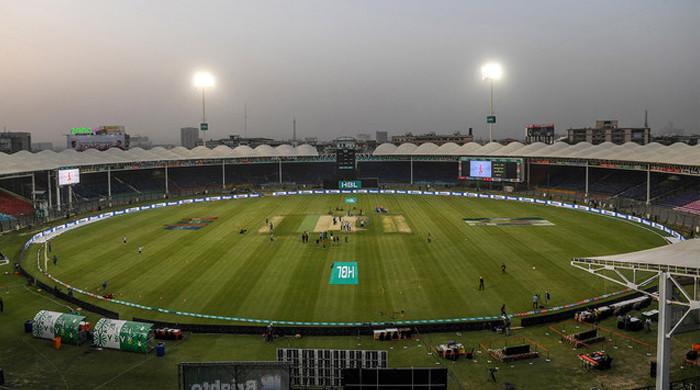
ISLAMABAD: A delegation of the International Cricket Council (ICC) met Pakistan Cricket Board (PCB) Chairman Mohsin Naqvi and discussed arrangements made for the ICC Champions Trophy to be held in the country next year.
The ICC envoy expressed satisfaction in Karachi and Rawalpindi for the preparations ahead of the tournament.
The delegation was also satisfied with the security arrangements and protocols in Karachi, Rawalpindi and Islamabad.
A detailed discussion on security arrangements for the tournament also took place in the meeting, said a press release.
The ICC delegation included ICC Senior Manager Events Sarah Edgar, Event Manager and Champions Trophy Event Lead Aun Muhammad Zaidi, General Manager Cricket ICC Wasim Khan, Security Manager David Musker and Broadcast consultant Mansoor Manj.
From the PCB, Director International Cricket Usman Wahla, Director Security Colonel (retired) Khalid Mehmood, and Head of Marketing Salman Mesud attended the meeting.
PCB Chairman Naqvi assured the ICC delegation of world-class arrangements for the ICC Champions Trophy 2025.
He further said that the upgradation work of the stadiums will be completed well before the tournament, and foolproof security arrangements will be made for all participating teams.
“Hosting the ICC Champions Trophy in Pakistan is an honour, and preparations are being finalised to match the grandeur of the tournament,” the cricketing body chairman stated.
Naqvi assured the ICC that all teams participating will enjoy playing in a peaceful and secure environment.
“After the upgradation, the stadiums will be equipped with international-standard facilities, enhancing the spectators’ experience,” Naqvi added regarding the work at the stadiums that will host the mega event next year.
“The Pakistani nation has a deep love for cricket and will support all teams during the mega event in February and March next year,” Naqvi concluded.


Ridley Scott reveals ‘Gladiator 3’ in process ahead of ‘Gladiator II’ debut
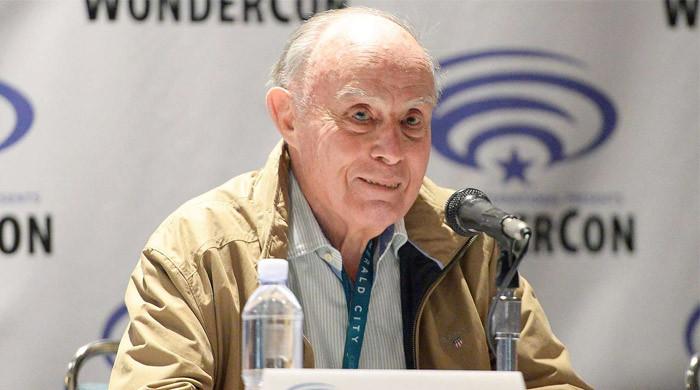
‘Peppa Pig’ voice actor David Graham breathes his last at 99
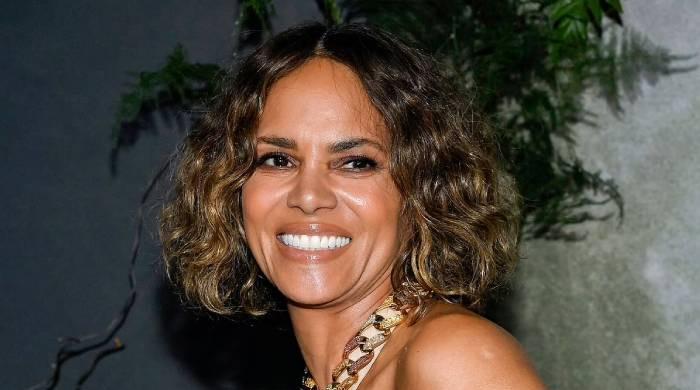
Halle Berry takes on mom duty as she supports her daughter amid heartbreakH

Samsung’s new midrange Galaxy A55 has improved security, features | The Express Tribune

New Zealand in efforts to fast track consenting of major projects – Pakistan Observer
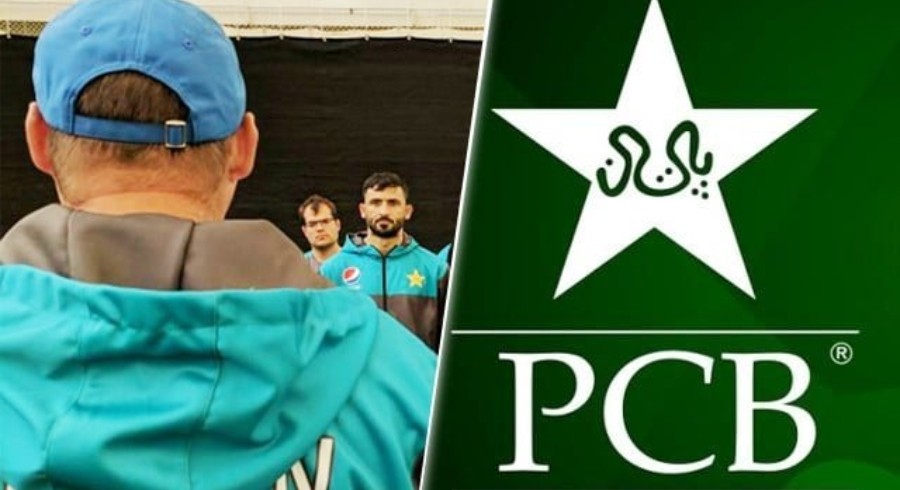
PCB opens applications for specialized red and white-ball coaches
Trending
-

 Technology6 مہینے ago
Technology6 مہینے agoSamsung’s new midrange Galaxy A55 has improved security, features | The Express Tribune
-

 Pakistan7 مہینے ago
Pakistan7 مہینے agoNew Zealand in efforts to fast track consenting of major projects – Pakistan Observer
-

 Sports6 مہینے ago
Sports6 مہینے agoPCB opens applications for specialized red and white-ball coaches
-
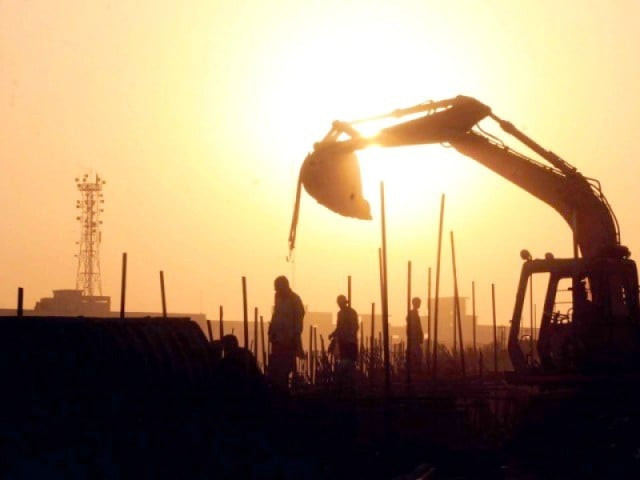
 Pakistan6 مہینے ago
Pakistan6 مہینے agoLegal issues hinder projects’ transfer | The Express Tribune
-
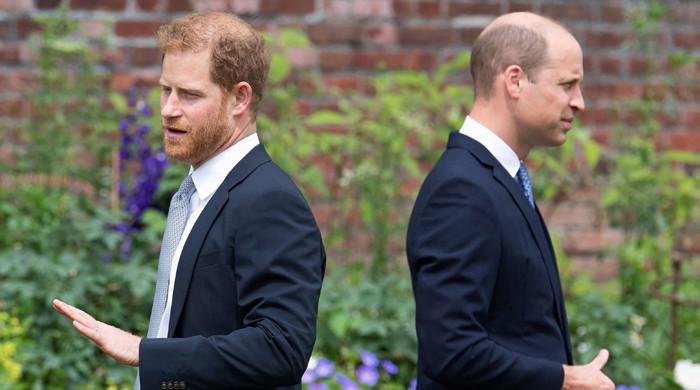
 Entertainment6 مہینے ago
Entertainment6 مہینے agoPrince William foils Prince Harry’s reunion plans ahead of UK return
-
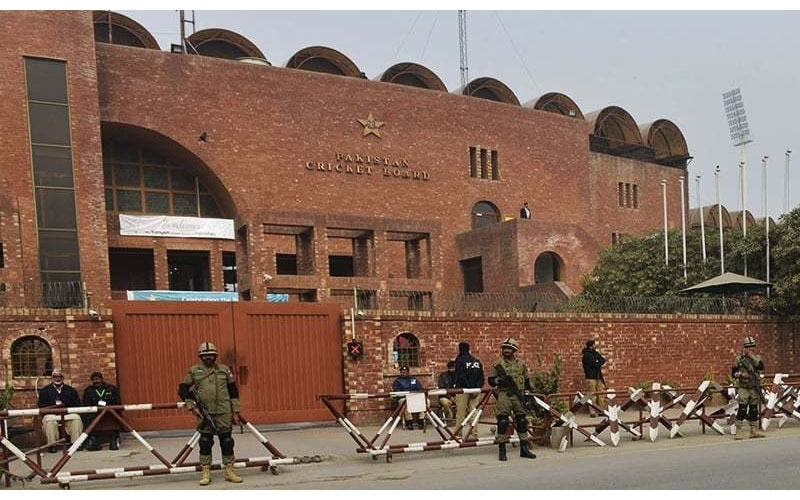
 Sports5 مہینے ago
Sports5 مہینے agoConversation continues between PCB, New Zealand for white ball series
-

 Pakistan7 مہینے ago
Pakistan7 مہینے agoNADRA NICOP fee March 2024 – Pakistan Observer
-

 Pakistan6 مہینے ago
Pakistan6 مہینے agoExperts call for regulation of ChatGPT in education | The Express Tribune
